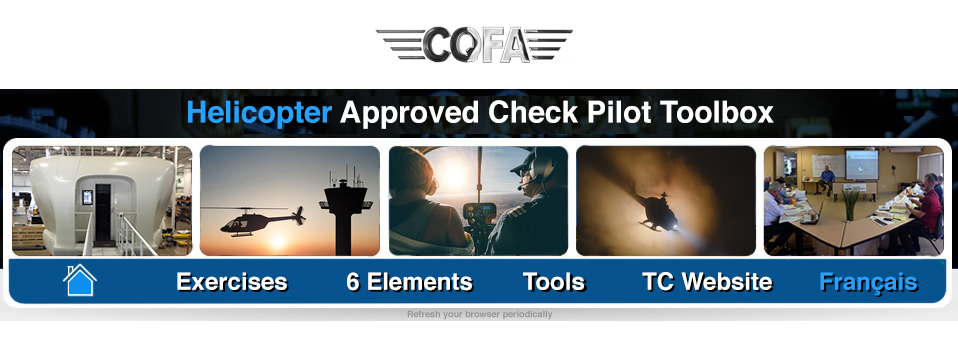Obtain an ACP Delegation
1. Meet the general ACP accreditation requirements (TP6533 Rev 1, 4.1 & subs)
- Hold a valid CPL (for PPC/VFR) or an ATPL (for PPC/IFR). The IFR rating is required to administer IFR PPC sessions.
- Hold a type rating for each type requested by the ACP candidate.
- Hold a valid PPC on the requested type.
- Hold valid certifications when appropriate, such as CAT II/III, RNP, RVR 1200/600/300, HUD, etc.
- Be or have been employed as pilot-in-command on the type(s), category and class requested.
- Have knowledge of company operations, manuals, SOP, MEL, etc
- Have at least 3000 hours total flight time, 1500 PIC. See TP6533 4.2 i) for IFR and Multi.
- Have experience as a training pilot
- Hold a valid Cat. 1 Medical.
- No conflict of interets that could undermine PPC sessions.
- Have a reputable safety record as a pilot.
- No conviction under the Aeronautics Act.
- Not more than one (1) conviction or administrative penalty under the CAR.
2. Initial ACP Accreditation Request and Candidate Pre-Assessment (TP6533 4.7, 4.8)
- ACP candidate must submit an initial application request.
- TC will the needs, expectations and professional suitability.
- TC will respond whether the accreditation can be pursued.
3. ACP Initial Course (TP6533 4.9)
- ACP candidate must successfully complete an approved initial ACP course.
- ACP candidate should seek additional exposures to PPCs to gain experience.
- ACP candidate must receive the ACP delegation within 36 months of the ACP course.
4. Knowledge Assessment (TP6533 4.10, SI-700-002 5.3)
- The process of becoming ACP requires long hours studying the manuals, the guides, the Act, the CARs after the initial ACP Course is completed. Transport Canada will assess the knowledge ACP candidate will acquire during this personal study, before the first monitor ride.
- ACP candidate must passed (80%) an oral knowledge assessment conducted by a CASI.
- Prepared questions will be based on the ACP Manual, the Flight Test Guide, the Aeronautics Act, the CAR and applicable references.
- Open book, 25-question oral assessment, corrected to 100%.
- Unsuccessful candidates will be sent back for retraining or could be refused.
5. ACP Initial Monitor (TP6533 4.11)
- The CASI will conduct one, two, or more monitor rides with the ACP candidate, on regular line operational crews.
6. Transport Canada Briefing (TP6533 4.12)
- Upon successful completion of the ACP knowledge assessment and the initial monitor(s), the CASI will provide the ACP candidate the Transport Canada briefing, designed to supplement and/or enhance the candidate's knowledge, explain the delegation by the Minister, review the principles of evaluation, administrative procedures and provide other advices.
7. Letter of ACP Accreditation (TP6533 4.17, SI 700-002 7.0)
- ACP candidate must receive the Letter of ACP Accreditation before conducting any PPC.
- This letter constitutes the formal authority for an ACP to conduct PPC.
- ACP candidate should receive the letter within 15 working days as indicated in (TP 14984).
Maintain an ACP Delegation
1. File an ACP Accredication Renewal Request (TP6533 4.14)
- Transport Canada will not notify an ACP of an expiring ACP accredidation.
- The request will be assessed according with the needs, suitability, etc
- The ACP candidate must meet the general ACP requirements.
- An expired ACP delegation for 24 months or more, requires an initial ACP course prior to scheduling a monitor.
2. ACP Recurrent Course (TP6533 4.15)
- Renewing ACP must successfully complete a certified recurrent ACP course.
3. ACP Recurrent Monitor (TP6533 4.16)
- The recurrent monitor is conducted during one or more PPC.
- The renewed delegation's validity if set by the CASI, up to 24 months.
- A monitor conducted on an expired ACP validity resets the new validity period.

